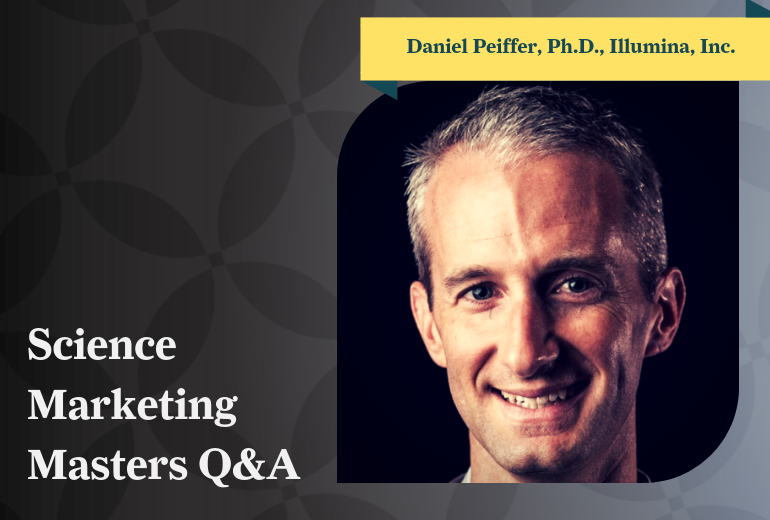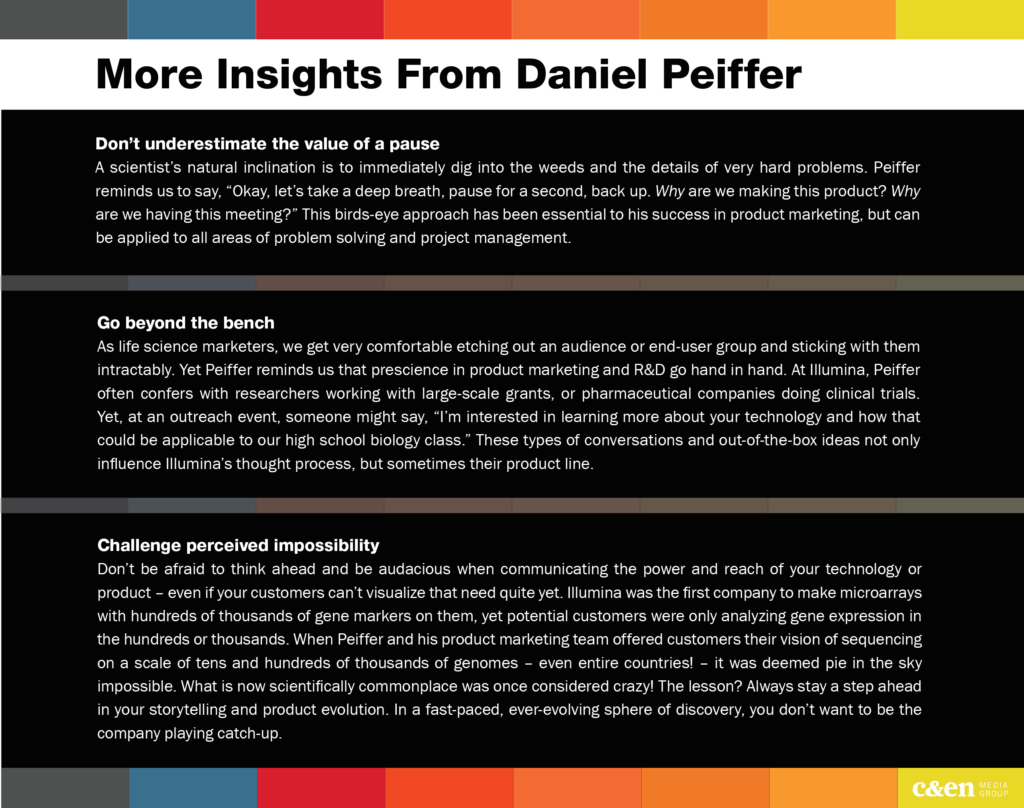One of the most successful biotechnology ventures in recent history is San Diego-based Illumina. Buoyed by the dawning age of the millennial genomics revolution, Illumina began as a startup built around array-based genotyping technologies and later added next-generation sequencing. In the 20 years since, the rapid pace of high-throughput innovation and whole-organism genome mapping have transformed our understanding of disease models, biological function and drug development. Today, Illumina is a global leader in the development, manufacture, and marketing of systems for large-scale analysis of genetic variation and function.
Dr. Daniel Peiffer joined Illumina after obtaining a Ph.D. in genetics, and has spent his career to date with the marketing team crafting clever strategies, leading product launches and aligning scientific innovation (including the company’s first genotyping microarrays and sequencing consumables) with customer solutions. As Illumina’s product line and market growth bourgeoned over the last decade and a half, so did Peiffer’s expertise, first as a postdoctoral fellow in research and development, then as a product manager and eventual associate director of product marketing. Throughout his journey as a life science researcher, product user, and eventually an award-winning product marketer, he learned many valuable lessons along the way. Now a member of the Illumina sales team, Peiffer joined C&EN Media Group to share his insights and perspective.
From the Bench to the Boardroom
Even as a young graduate student working in a frog genetics laboratory at UC Irvine, Daniel Peiffer had many divergent talents and interests. He liked working in science, but it wasn’t his sole passion. He was fascinated by the business side of science. He read The Financial Times daily. He enjoyed putting together PowerPoint presentations and talks on various research developments. What he thought were career liabilities ended up becoming strengths when, during a postdoctoral fellowship at Illumina, one of his mentors suggested he jump over to product marketing.
The combination of an experimental background, business acumen, and communication talents made him an instant fit. “I learned along the way that if there’s something else that is interesting to you, it’s okay to keep an eye on it and learn about it on the side. You never know when an opportunity may present itself,” Peiffer notes. It helped that he received a lot of support and encouragement from top executives, even though he felt he lacked direct experience. He believes companies would benefit greatly from taking some risks and drawing from a wider pool of talent, especially as alternative careers for academic scientists become more prevalent and encouraged.
Why Storytelling Is (Still) the Most Critical Messaging Anchor
As a marketing neophyte with no formal training, Peiffer didn’t yet know about inbound campaigns or SEO keywords. Instead, he relied on what he was instinctually good at – storytelling. Soon, he was encouraged to go explain Illumina technology to an important client, or work on a presentation for the CEO, or boil down key corporate talking points for external stakeholders. “I never considered myself an incredible scientist,” says Peiffer. “But what I really found myself to be good at was listening to folks that are really incredible at science and then distilling that into a great example or story that other people could digest.”
Why is storytelling in marketing so important? Platforms change and so do company goals and technology, but core business needs are consistent. A complicated scientific concept might have to be boiled down with simplicity for executives who don’t have a technical background. A new user may have to be onboarded for the very first time. In the fast-paced world of B2B commerce, you will never have more than five minutes of a potential customer’s attention to hook them. Be compelling. Be bold. Be simple.
Harmonizing Sales and Marketing for Efficiency and Growth
Dissonance between marketing and sales operations is a common frustration, and leads to inefficiency in gathering and closing leads. Peiffer encourages companies to welcome cross-pollination between different functional groups. At Illumina, where there is a strong alliance between the sales and marketing teams, employees often have direct experience working with several groups rather than getting siloed into one department. This is not only beneficial to an employee’s career development, it broadens available expertise: customer engagement, technical support, interacting with scientists and researchers, and product launches.
Hiring team members with a diverse set of backgrounds and experiences allows everyone to learn from each other in a dynamic and complex environment. At Illumina, a product marketing group might be composed of former customers, core lab managers, creative writers, applications scientists and business executives.
Peiffer emphasizes the importance of synergizing efforts around different end-user personas, and tailoring campaigns on their end goals and deliverables, whether that is a specific type of customer, executive, investor, or internal collaborator. It’s easy to lose sight of the big picture in the face of meetings, emails and fighting various fires. But these are usually straightforward and simple objectives that form the fundamental architecture of sales and marketing projects.
As Peiffer points out: “Ultimately, we are all in this to make sure that our customers are successful using our products, and it’s really paramount to keep them in your mind 24/7.”
How to Stay Ahead When Changes Impact Products
Marketers need to be able to anticipate the trends and forces that might impact product use, development, or evolution and react accordingly.
An influx of new end-user personas may mean integrating new tactics to old campaigns. Millennials, who are rapidly ascending into key decision-making roles in all areas of research and development, are better impacted by emotional and experiential inbound marketing techniques. Illumina has responded to this through efforts such as seminars, happy hours and social media. “We have a podcast series every other month where we discuss how genomics is changing life right now, whether it’s making crops healthier to produce more food, or direct-to-consumer genomic testing to learn more about health and ancestry,” notes Peiffer. “We don’t necessarily talk about the nitty-gritty details of how our technology works or the science behind it, because most people, while they’re listening to an informational podcast, don’t care.”
Indeed, scientific breakthroughs or newsworthy issues may change who is interested in your product, which in turn changes where and how companies go to tell their story. Advances like CRISPR, immunotherapy and even direct-to-consumer testing have greatly broadened interest and utility of genomics and sequencing. That may mean a neuroscientist wants to use genome mapping for investigating schizophrenia. Or a farmer sequencing the genomes of their crops for a higher yield. Or that the product line itself changes by necessity: Illumina started out in array technology, then sequencing instruments, but has added analysis software, reagents and other clinical research products to facilitate easier entry points into use and greater utility for a wider array of users.
In that regard, in their thirst for never becoming complacent, Illumina has retained a startup mentality, especially when it comes to marketing. “Keep a keen eye on what’s happening in the world and in scientific journals,” Peiffer recommends. “The pace at which this space moves can make your job really challenging, but you have to make sure you’re developing the best product that fits current needs.”
That being said, from navigating the marketing landscape of an established startup to launching multi-generation product lines and market-leading technology, Daniel Peiffer hasn’t changed his approach much over the years. His philosophy is rooted and driven by a trifecta of principles that are salient to any strategy or platform: compelling product narratives, advancing the challenges of what is possible to achieve, and helping customers to succeed.



















